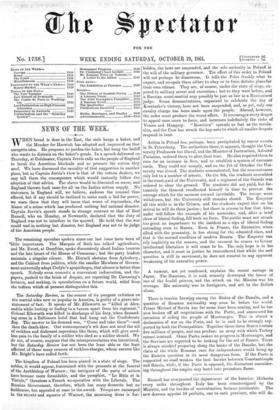The kingdom of Poland has been placed in a state
of siege. The nobles, it would appear, fraternized with the peasants at the funeral of the Archbishop of Warsaw; the intrigues of the party of action have become more formidable, and the pamphlet, "Le Rhin et la Vistule," threatens a French co-operation with the Liberals. The Russian Government, therefore, which has many demerits but no feebleness, has appealed at once to the sword. Troops are encamped in the streets and squares of Warsaw, the mourning dress is for-
bidden, the laws are suspended, and the sole authority in Poland is the will of the military governor. The effect of this order in Poland will not perhaps be disastrous. It tells the Poles frankly what to expect, and compels them either to obey or to form definite plans for their own release. They are, of course, under the state of siege, ex- posed to military arrest and execution ; but so they were before, and a Russian court-martial may possibly be just as fair as a Russianized judge. Some demonstrations, organized to celebrate the day of Kosciusko's victory, have not been suspended, and, as yet, only one cavalry charge has been made upon the people. Abroad, however, the order must produce the worst effect. It encourages every despot to appeal once more to force, and increases indefinitely the risks of Venice and Hungary. " Reactio n" spreads as fast as the revolu- tion, and the Czar has struck the key-note to which all smaller despots respond in tune.






























